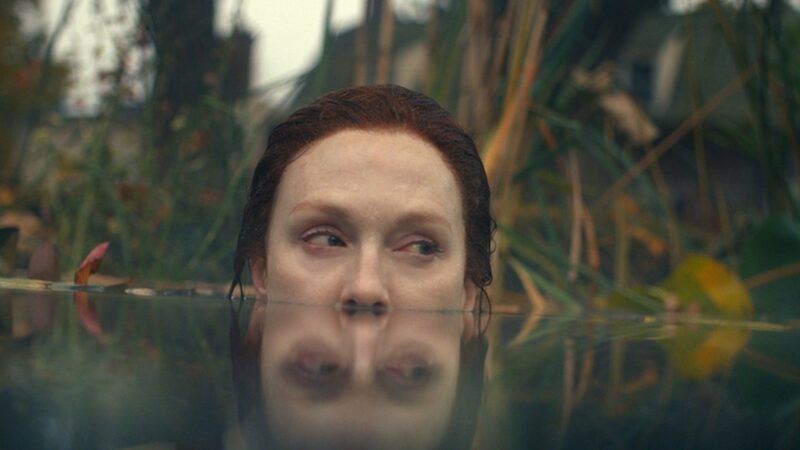Lisey's Story: Bad Stephen King Book Gets Terrible Apple TV Adaptation
Talented actors like Julianne Moore, Joan Allen go to waste

Lisey's Story. Available Friday, June 4, on Apple TV.
"Every marriage has its own secrets," reads the epigraph on Apple TV's new Stephen King series Lisey's Story. To which many a viewer is going to add: "If only."
Adapted exclusively by King from his own 2006 novel, Lisey's Story is a mess in almost every conceivable way. It's drawn from a leaden and forgettable novel, and King's ponderous attempt at a screenplay has done nothing to improve it. Neither has Chilean director Pablo Larrain's painfully arty translation of the written word into video. And while Lisey's Story is loaded with female star power—Julianne Moore, Jennifer Jason Leigh and Joan Allen play sisters—King and Larrain have given them little to do except look head-bangingly anguished or (in Allen's case) catatonic.
I've been a fan of King since I first read his when-high-school-bullying-goes-wrong novel Carrie in 1975. (Consumer tip: Don't try this alone in your first night in your first house.) But in recent years, his books more and more often read like legal briefs written by somebody bidding for conservatorship of his estate: lots of dull prose and too-familiar storylines. The novel Lisey's Story was a good example, a dreary autopsy on a marriage that was a lot more interesting dead than alive, filled with stuff recycled from his other books: spooky hotel a la The Shining, a private graveyard like the one in Pet Sematary, a homicidal fan strikingly like the one in Misery.
The creepiest thing about the book was that King thought it was one of his best. The second-creepiest was King's explanation of what triggered it: Coming home from a prolonged hospital stay, he discovered his wife had redecorated his writing studio and all his books and papers were gone from the shelves, stored in boxes. To King, it seemed like he was witnessing the clean-up after his own death.
And that is exactly the kick-off point for Lisey's Story. Two years after a King-like horror novelist named Scott Landon (Clive Owen, The Knick) was gunned down by a crazed fan, his wife Lisey (Moore) is trying, though not very hard, to catalog his papers, including some unpublished stories and books. She is increasingly annoyed by a college professor (Ron Cephas Jones, This Is Us) who specializes in the study of Landon's work and wants access to the papers.
But that seems like a small problem compared to the mental collapse of Lisey's sister Amanda (Allen), who reverts to her old habit of slashing herself at the news that her ex-husband has remarried. But wait! That acquisitive college professor enlists a young goon (Dane DeHaan, In Treatment) to assist him in getting hold of Landon's manuscripts, using knives and torches and such to help.
That little summary I just provided was assembled only by heroic effort on my part, given that Lisey's Story is a mélange of inscrutable noir photography, flashback, flashbacks within flashbacks, hallucinations, mystic visions, alternate universes, nightmares—pretty much everything but a random guy punching Dan Rather in the face while screaming, "Kenneth, what is the frequency?" When the show threatens to lapse into coherence (don't worry, it doesn't happen often), the characters start conducting expository conversations through mouthfuls of mushy fried chicken.
Not that comprehensibility is entirely desirable in Lisey's Story. King has littered the screenplay (and before that, the book) with a maddening baby-talk language among the sisters, in which they call one another "babyluv" and worse. Worst of all is the constant reference to "bool hunts"—a sort of weird scavenger hunt that Landon set up for his wife before his death, the grand prize being, well, nothing—and an alternate universe known as "Boo'ya Moon," which makes even less sense than the regular one. King's objective seems to have been to see how many times "bool" and "Boo'ya" can be spoken aloud before viewers begin projectile vomiting at the screen; I don't know what the number is, but I can tell you it's reached in the first seven minutes of the first episode.
All the foregoing aside, there are a few lessons that can be drawn from Lisey's Story. One is that studio executives need to start slapping the teeth out of screenwriters and directors who believe that the illiteracy of films can be masked if you stuff them with enough undifferentiated flashbacks.
Another is that God provided us with studio lighting for a purpose—that is, to light studios. Shooting everything in abject blackness is not arty, it's stupid.
And third is that Jennifer Jason Leigh is a wittily mean actress, as she has proved in everything from Weeds to The Hudsucker Proxy. Putting her in TV show just to stand around for 10 hours is a bunch of bool.
